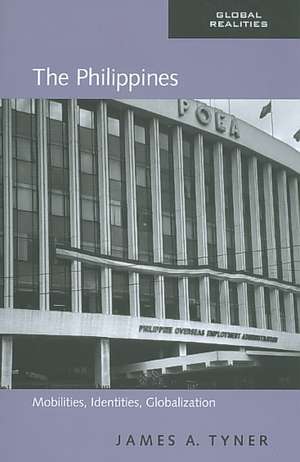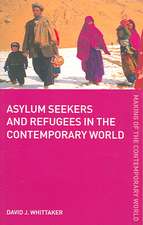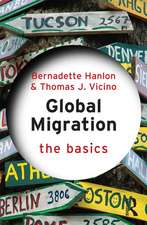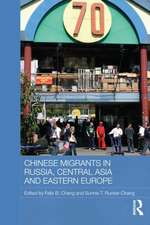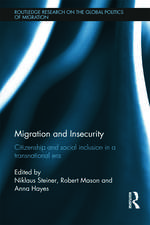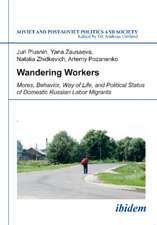The Philippines: Mobilities, Identities, Globalization: Global Realities
Autor James A. Tyneren Limba Engleză Paperback – 19 sep 2008
For over five centuries the Philippines has been integrated into the world economy. Only recently, however, has the Philippines been a pro-active agent in the production of a global economy. Since the 1970s the Philippine state, in connection with myriad private institutions, has recruited, trained, marketed, and deployed a mobile work-force. Annually, approximately one million migrant workers travel to all corners of the world. The Philippines seeks to understand how the Philippines has become the world’s largest exporter of government-sponsored temporary contract labor and, in the process, has dramatically reshaped both the processes of globalization and also our understanding of globalization as concept.
Preț: 350.11 lei
Nou
Puncte Express: 525
Preț estimativ în valută:
67.00€ • 69.22$ • 55.76£
67.00€ • 69.22$ • 55.76£
Carte tipărită la comandă
Livrare economică 26 martie-09 aprilie
Preluare comenzi: 021 569.72.76
Specificații
ISBN-13: 9780415958073
ISBN-10: 0415958075
Pagini: 248
Ilustrații: 10 b/w images, 9 tables and Following Global Ireland
Dimensiuni: 129 x 198 x 18 mm
Greutate: 0.46 kg
Ediția:New.
Editura: Taylor & Francis
Colecția Routledge
Seria Global Realities
Locul publicării:Oxford, United Kingdom
ISBN-10: 0415958075
Pagini: 248
Ilustrații: 10 b/w images, 9 tables and Following Global Ireland
Dimensiuni: 129 x 198 x 18 mm
Greutate: 0.46 kg
Ediția:New.
Editura: Taylor & Francis
Colecția Routledge
Seria Global Realities
Locul publicării:Oxford, United Kingdom
Public țintă
UndergraduateCuprins
1. Local Contexts, Distant Horizons 2. Manufacturing a Global Presence 3. Manila's Place in the World 4. Global-Philippines.Com 5. Performing Globalization 6. Beyond the Philippines
Notă biografică
James A. Tyner (Ph.D., University of Southern California) is Professor of Geography at Kent State University. His research interests include population geography, political geography, and Southeast Asia. He is the author of nine books, including Made in the Philippines: Gendered Discourses and the Making of Migrants (Routledge).
Recenzii
"This book by a talented scholar of Philippine migration captures the monumental significance as well as the personal intimacy of Philippine international migration and its place in the global economy. Given Tyner’s accessible writing style and his unique and well researched examination of the apparatus of the migration industry, this book is likely to become required reading for a wide range of students and scholars in migration and globalization." –Nicole Constable, University of Pittsburgh
"The Philippines offers a definitive account of globalization through migration. Situating the labor export policies of the Philippine state in historical, economic, political and cultural context, Tyner shows how structural processes shape individual experience. His superbly-crafted analysis makes it clear why Filipino migration has become paradigmatic of 21st century globality." –Deirdre McKay, Keele University, UK
"With the Philippines as its stage, this book deftly weaves together the mixed experiences and multiple effects and outcomes of international labour migration. Theoretically informed and yet empirically grounded, James Tyner shows how migration connects the country of the Philippines and its inhabitants with global labor markets, stretching social relations, livelihoods, identities, dependencies and desires across space and through time." – Jonathan D. Rigg, Durham University, UK
"The Philippines offers a definitive account of globalization through migration. Situating the labor export policies of the Philippine state in historical, economic, political and cultural context, Tyner shows how structural processes shape individual experience. His superbly-crafted analysis makes it clear why Filipino migration has become paradigmatic of 21st century globality." –Deirdre McKay, Keele University, UK
"With the Philippines as its stage, this book deftly weaves together the mixed experiences and multiple effects and outcomes of international labour migration. Theoretically informed and yet empirically grounded, James Tyner shows how migration connects the country of the Philippines and its inhabitants with global labor markets, stretching social relations, livelihoods, identities, dependencies and desires across space and through time." – Jonathan D. Rigg, Durham University, UK
Descriere
Nearly five million migrant workers from the Philippines are employed in over 190 countries and territories. They work as doctors and domestic helpers, engineers and entertainers, seamstresses and surveyors. It is through their collective labor that the Philippines has assumed a global presence.
The Philippines: Mobilities, Identities, and Globalization seeks to understand how the Philippines has become the world’s largest exporter of government-sponsored temporary contract labor and, in the process, has dramatically reshaped both the processes of globalization and also our understanding of globalization as concept.
The Philippines: Mobilities, Identities, and Globalization seeks to understand how the Philippines has become the world’s largest exporter of government-sponsored temporary contract labor and, in the process, has dramatically reshaped both the processes of globalization and also our understanding of globalization as concept.
